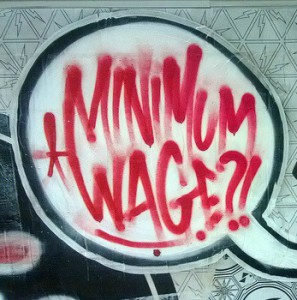
The Minimum Wage in Ireland
25 Mar 2013Introduction
The Minimum Wage was introduced in Ireland by the National Minimum Wage Act 2000 . It states an hourly wage above and equal to which employers must pay employees. Since July 2011, the Minimum Wage guarantees an hourly wage of €8.65 to adult employees over the eighteen with at least two years previous employment experience. For teenagers under the age of eighteen, this wage guarantee is €6.06 per hour. This increases with a first year of employment over the age of eighteen to €6.92, and with two years of employment experience over this age to €7.79. Exceptions exist for both employees who are close relatives to the employer, and those undertaking structured training schemes, such as apprenticeships. In October 2007 it was estimated that 4.9% of employees in Ireland, approximately 83,700 people at the time, were earning the Minimum Wage. This report will discuss how the Minimum Wage has changed within Ireland since its introduction. It will then compare the Minimum Wage in Ireland with both within the European Union and across OECD nations.
Minimum Wage and Inflation
Since its introduction in 2000, we may compare how the Minimum Wage has adjusted compared to inflation. Inflation is the increase in prices over time. If prices were to increase with no change in the Minimum Wage, then individuals earning this wage are relatively worse off, and vice versa. Figure 1 outlines how inflation and the Minimum Wage have changed relative to the first year of available data in 2000. The observation for each individual year shows the price level and Minimum Wage as a proportion of its value for the year 2000. It shows that the Minimum Wage in Ireland has increased greater than the price level. Therefore, an individual earning the Minimum Wage is comparatively better off in 2012 than when the Minimum Wage was introduced in 2000. The divergence of the Minimum Wage from the price level is most drastic from 2004 onwards. If the ratio of the Minimum Wage to the price level were the same in 2012 as when it was introduced in 2000, the Minimum Wage would be approximately €7.42 an hour.
Source: Annual CPI, Central Statistics Office ; Eurostat
Comparison across European Union countries
Twenty of the twenty-seven European Union countries have statutory national legislation that formally sets a Minimum Wage for employees. Notable exceptions include Denmark, Germany, Italy and Sweden . Figure 2 below outlines the Minimum Wage across these twenty countries. The values for countries like Ireland, who set an hourly Minimum Wage as opposed to a monthly amount, have been adjusted to the monthly scale. This adjustment estimates the equivalent of Ireland’s Minimum Wage to equate to approximately €1462 per month . Figure 2 outlines the nominal values of the Minimum Wage for this sample of European Union countries in 2012.
Source: Eurostat, statutory minimum wages1
It shows that the Minimum Wage in Ireland is the second highest in the European Union, only less than that of Luxembourg. However, this fails to account for differences in price levels between countries. For instance, if wages in one country were double that of another, but the prices of goods were double too, the average earner in each country would have the same standard of living. Hence the Minimum Wage under this measure would be deemed the same. Adjusting for Purchasing Power Parity takes into account the differences in the costs of goods and services across countries. Figure 3 shows this adjustment for the year 2012. It shows that when relative prices are taken into account, the value of the Minimum Wage falls by approximately 14% in Ireland. With this adjustment, Ireland has the fifth highest Minimum Wage in the European Union. This adjustment highlights that prices in the Netherlands, Belgium and France are less expensive than in Ireland.
Source: Eurostat, monthly minimum wages adjusted for purchasing power2
The effect of this price adjustment is notable when comparing Ireland with the United Kingdom. The Minimum Wage before the adjustment is 27% higher in Ireland than the United Kingdom. However, once the adjustment is made for the cost of goods and services, the Minimum Wage differential is relatively lower, at 10%. Therefore, although the nominal values of the Minimum Wages show a significant difference, an individual earning the Minimum Wage in Ireland is only approximately 10% wealthier than a comparative individual in the United Kingdom.
Minimum Wage and Average Wages
Figure 4 outlines the ratio of median wages across a sample of 24 countries to the Minimum Wage for the year 2011.
Source: OECD, Minimum relative to average wages of full-time workers3
The median wage is the income earned by the middle earner of all individuals. At this wage, half of those employed in a country earn more and half earn less. The greater the value of this ratio, the closer the Minimum Wage is to this average measure. This may act as an approximation for the distribution of income. Ireland has a ratio of approximately 0.48. The graph shows that of the sample of countries available, Ireland is averagely placed. This analysis may be extended over the time period of Minimum Wage legislation in Ireland. Figure 5 compares the Minimum to average ratio in Ireland to that of the United Kingdom, United States and an average of the sample of countries from the OECD.
Source: OECD, Minimum relative to average wages of full-time workers3
It shows that, although higher than comparative economies since its introduction, this ratio has recently converged towards similar values to the United Kingdom and United States.
Notes:
1Figures assume an average of 39 hours worked per week, for 52 weeks per year
2Eurostat: Monthly minimum wages in euro, Purchasing Power Standards (PPS)
Figures given averaged out over bi-annual data for 2012
3Dataset LFS- Minimum relative to median wages of full-time workers









